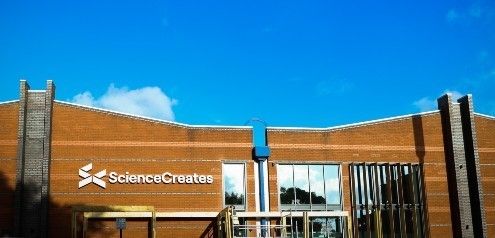By James Emery, SciTech Deputy Editor
As Science Creates continues to grow as a hub for local scientists and tech innovators, James Emery explores its on the local community
Science Creates, a Bristol-based deep tech ecosystem which helps to nurture new science and engineering start-ups, has opened a brand new incubator within the city. It is hoped that this new incubator will help to solve pressing world issues such as cancer, vaccine development and climate through supporting the new generation of scientists-turned-entrepreneurs.
The opening of this new incubator, located in Old Market, has been due to the success of the first incubator in St Philips, which is currently at full capacity and has put Bristol on the map as a hub of science and engineering innovation. Science Creates is already home to some of the most successful deep tech companies in the UK who in 2021 alone amassed £18.4 million.
As part of a partnership with the University of Bristol and Research England, the new incubator will give an extra 30,000 sq ft of state-of-the-art laboratories and office space for use by deep tech start-ups. This brings the physical footprint of Science Creates in Bristol to 45,000 sq ft, housing around 100 companies and providing 450 potential jobs.
'Bristol continues to grow as a hub for helping scientists take their discoveries off the shelf and into the real world'
Some of the companies supported by Science Creates include:
Cytoseek- a company which uses artificial membrane binding protein technology to deliver the potential of the next generation of cell therapies, with a focus on treating solid tumours. It has been able to raise £4 million with the help of Science Creates.
KETS Quantum Security- their goal is to help protect data from a new generation of cyber attacks by quantum computer, through the production of chip-based solutions.
Ziylo, one of Science Creates original companies, is a biotech company working to develop one of the first smart insulins to help people suffering from diabetes. In 2018, it was purchased by pharmaceutical giant Novo Nordisk in a deal potentially worth $800 million.
With the Omicron variant posing significant challenges to the UK’s Covid-19 response, is there a tool that can help?
— Science Creates (@ScienceCreates) December 21, 2021
Meet @halotherap and the game-changing antiviral nasal spray that could work against all coronavirus variants.https://t.co/D7ZiAtAdPd#deeptech #antiviral
The founder of Science Creates, Dr Harry Destecroix, told Epigram that: 'The city [Bristol] is home to creative, innovative trendsetters and it has world-class research universities and a strong sense of community. But we are only just getting started. Bristol continues to grow as a hub for helping scientists take their discoveries off the shelf and into the real world. Our strength lies in deep tech – an area that is growing more than twice as fast as any other tech sector.'
'This is where Science Creates comes in. We have two purpose-built incubators, a venture capital firm funding early-stage start-ups, and a network of mentors and advisors with specific, relevant experience – all of which is vital for business development and innovation.'
Science Creates also launched a dedicated venture capital fund, in 2020, called Science Creates Ventures which, in partnership with the incubators, have promoted ambition in companies and allowed them to raise the capital they need. This has contributed to Bristol quickly becoming a leader in deep tech innovation, rivaling many of its European counterparts like Barcelona and Oslo.
Bristol Technology Festival is ‘changing the face of tech’ in its upcoming week of events
‘Breakthrough Bursary’ aimed at BAME tech entrepreneurs relaunched by the University
In 2020, Bristol had an estimated venture capital of over £400 million with the majority of it being reinvested into the companies. This is expected to continue into 2021 – as shown by data from Tech Nation – with it attracting the second highest VC in the UK.
It is hoped that this incubator initiative will allow Bristol to become famous for being a world-class ecosystem that supports scientists and engineers in commercialising ground-breaking tech innovations.
Featured Image: Epigram/University of Bristol
What do you think is the future for technological innovation in Bristol?









